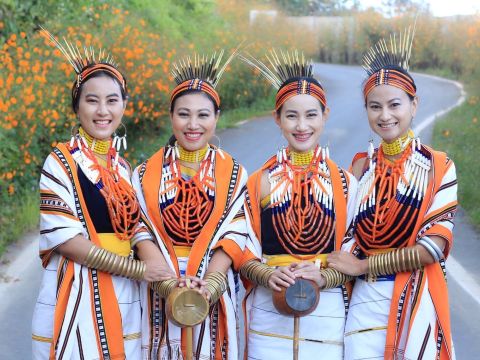Music for Harmony, Music for Peace
Despite “customary” restrictions, Naga women have successfully paved their way in various fields ranging from politics to literature. In the field of music, we have the Tetseo Sisters, a quartet of four siblings (Alunë or Lulu, Kuvelü or Kuku, Mütsevelü or Mercy and Azi Tetseo) who, through their music and storytelling, celebrate the beauty of the hills and valleys of their native place. Belonging to the Chakhesang tribe and based out of Kohima, the band was formed in 1994 and they strive to preserve the tradition of "Li", which in the Chokri Naga language means "folk songs". Like most Naga traditions, these Li too have been passed down orally over the generations by their ancestors.There are are Li for various situations such as laments, war songs and songs that are related to agriculture and its seasonal activities and these Li are often accompanied by instruments such as the "tati libuh" or "heka libuh". The Chakhesangs have a treasure trove of such songs and "Li kukre kutiko" is the compilation of 223 such folk songs that have been preserved over the years.
Besides preserving their native folk traditions, the music of the band also advocates issues such as gender equality, the safety of women and environment protection; and the Tetseo Sisters believe that music has the ability to heal and also ensure harmony.
Chakhesang - The Chakhesangs are a major Naga ethnic group who were formerly the Eastern Angamis butnow are recognised as a separate tribe.
Li – Chokri Naga word for Folk Songs or “songs of the people”
Li kukre kutiko – Name for the collection of 223 folk songs or Li amongst the Chakhesangs.
Tati Libu, Heka Libuh – A traditional single-stringed Naga instrument measuring about 3–4 foot in length made of a dried bottle-gourd after it has been carved out
